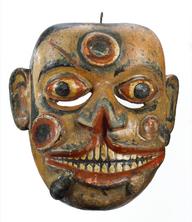





Large 'Roller' needle, known as Gyokusho, in box, used in Shonoshin therapy, a non-invasive form of acupuncture developed for young children, from the surgery of a British practitioner c.1996, manufactured by Kanaken Medical Instruments Inc, Japanese, 1980-1990.
This ‘Gyokusho’ roller was used in Shonoshin therapy. Shonoshin is non-invasive acupuncture for children. The skin is scratched with brushes, combs and massage rollers during Shonoshin to stimulate the acupuncture points. In Traditional Chinese Medicine (TCM), acupuncture needles are normally inserted into certain points on the skin. This unblocks the flow through the body of a life force known as qi (chi). TCM practitioners believe qi is essential to wellbeing. It was manufactured in Japan, and donated by a British TCM practitioner.
Details
- Category:
- Asian Medicine
- Object Number:
- 2002-493
- Measurements:
-
roller: 24 mm x 139 mm x 70 mm, .28 kg
box: 29 mm x 152 mm x 77 mm, .02 kg
- type:
- acupuncture needle
- credit:
- Kelley, R.




